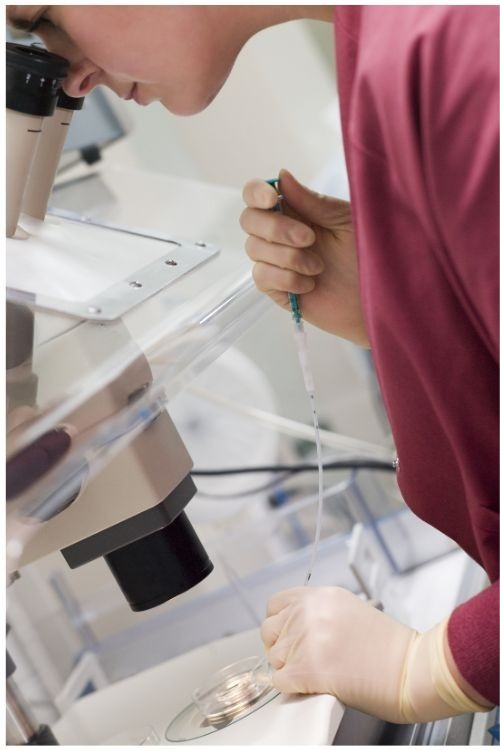Third-Party Reproduction: Fueling Dreams through Surrogacy and Donation
You will learn:
- What is Third-Party Reproduction?
- What is Fertility Donation?
- 3 Types of Fertility Donation
- Surrogacy: Bringing Dreams to Life
- What is a Gestational Carrier Surrogacy?
- Gestational Carriers: Empowering Parenthood for Those Facing Challenges
- Traditional vs. Gestational Surrogacy: Why the Shift Towards Gestational Surrogacy?
What is Third-Party Reproduction
Third-party reproduction options, including egg donation, sperm donation, embryo donation, and surrogacy, offer hope and the possibility of parenthood for individuals and couples facing infertility challenges. These remarkable paths empower individuals to overcome obstacles, build families, and experience the profound joy of welcoming a child into their lives. With the support of fertility clinics and dedicated professionals, the dreams of parenthood can become a reality, creating a future filled with love and cherished moments.
Conceiving a child is a cherished dream for many, but when faced with infertility challenges, individuals and couples may find solace in third-party reproduction options. There are many available options that offer hope and the opportunity to build families, including egg donation, sperm donation, embryo donation, and surrogacy.
What is Fertility Donation?
Donation in fertility medicine refers to when people donate their own sperm, eggs or embryos to another person or couple to help those individuals achieve pregnancy.
Donation is needed in various situations within the realm of fertility medicine. It may be required when individuals or couples face challenges such as:
- Poor Egg Quality: In cases where the intended mother’s eggs are of low quality or unable to result in a successful pregnancy, egg donation can provide a viable solution.
- Ovarian Dysfunction: Women who experience ovarian dysfunction or premature ovarian failure may require egg donation to achieve pregnancy.
- Male Factor Infertility: When the male partner has low sperm count, poor sperm motility, or genetic abnormalities, sperm donation can help overcome these challenges.
- Genetic Disorders: Couples with a high risk of passing on genetic disorders to their offspring may opt for embryo donation, using donated embryos that have been screened for genetic conditions.
- Absence of Uterus: Women born without a uterus or who have had their uterus removed may choose gestational surrogacy, where a gestational carrier carries the pregnancy on their behalf.
- Same-Sex Couples: Same-sex male couples or single men seeking parenthood will require both egg donation and a gestational carrier to have a child.
- Same-Sex Female Couples: Same-sex female couples or single women may require sperm donation and potentially, if needed, embryo donation or gestational surrogacy.
In these and other scenarios, donation becomes an invaluable option, offering hope and the possibility of parenthood to individuals and couples who may face limitations in conceiving on their own.
Gestational surrogates, egg donors and sperm donors are typically paid for their time and effort. Outside of financial benefits, some people choose to become a gestational carrier or donor because they find value in helping others build their families.
3 Types of Fertility Donation
Embarking on the journey of exploring donor options such as donor sperm, donor egg, and donor embryo opens the door to expanding your opportunities to realize your dream of building a family.
Egg Donation: Empowering Hope
Egg donation is a selfless act in which a woman voluntarily donates her eggs to help another woman or couple conceive. This method is commonly used in cases where the intended mother faces issues such as poor egg quality or ovarian dysfunction. The donated eggs are fertilized through in-vitro fertilization (IVF), and the resulting embryos are transferred to the recipient’s uterus. Egg donation not only provides the chance for a biological connection between the intended father and the child but also brings hope and the possibility of pregnancy to those who may have otherwise struggled.

Egg donation is when a young, fertile woman chooses to donate her eggs for a couple’s or individual’s use in IVF. Using donated eggs is increasingly common, as women’s eggs deteriorate in quantity and quality as they age, particularly for smokers and women in their 40s. Poor eggs are a common cause of infertility.
People looking to use donor eggs generally select an anonymous donor by working with an egg donor organization and reviewing the donor’s physical characteristics, family and personal health histories and a description of her personality. Donor eggs may also come from a known donor, such as a family member or friend.
Women who elect to be donors are screened by fertility doctors to make sure they are healthy and to reduce the risk for inheritable diseases. Before an egg retrieval procedure, egg donors typically take ovulation induction medication. This stimulates egg production in the ovaries and allows a fertility doctor to retrieve multiple eggs, rather than just the normal single egg a woman ovulates on a monthly basis. Donated eggs can be used immediately in a “fresh” IVF cycle or can be cryopreserved (frozen and stored) for later use.
The Vital Role of Egg Donation in Fertility
Egg donation is needed in fertility medicine in various situations where individuals or couples face specific challenges that prevent them from achieving pregnancy using their own eggs. Here are some common scenarios where egg donation is considered:
- Diminished Ovarian Reserve: Women with diminished ovarian reserve have a reduced quantity or quality of eggs, making it difficult to conceive with their own eggs. Egg donation provides them with a viable option to achieve pregnancy.
- Premature Ovarian Failure: Premature ovarian failure occurs when a woman’s ovaries stop functioning before the age of 40, leading to infertility. Egg donation allows these women to have a chance at pregnancy and biological motherhood.
- Genetic Disorders: Couples with a high risk of passing on genetic disorders to their offspring may choose egg donation to avoid the transmission of those genetic conditions. By using donated eggs from healthy individuals, they can increase the chances of having a healthy child.
- Poor Response to Ovarian Stimulation: Some women may not respond well to fertility medications used to stimulate egg production during in vitro fertilization (IVF) cycles. In such cases, egg donation offers an alternative pathway to parenthood.
- Age-related Infertility: As women age, the quality and quantity of their eggs decline, leading to diminished fertility. Egg donation provides an opportunity for older women to conceive using eggs from younger, healthy donors.
- Surgical Removal of Ovaries: Women who have undergone surgical removal of their ovaries due to medical reasons, such as ovarian cancer, may need egg donation to have a biological child.
- Same-Sex Male Couples: Same-sex male couples who desire to have a biological child will require the use of donated eggs, in addition to a gestational carrier, to achieve pregnancy.
Egg donation offers hope and the possibility of parenthood to individuals and couples who may face limitations in conceiving with their own eggs. It is a remarkable option that opens doors to new opportunities and the joy of building a family.
Sperm Donation: Empowering Fertility Alternatives for Building Families
Sperm donation plays a vital role in helping single women, same-sex couples, or couples facing male factor infertility to achieve pregnancy. It involves a generous act in which a male voluntarily donates his sperm. The donated sperm can be used in various fertility treatments, such as intrauterine insemination (IUI) or IVF. Sperm donors undergo rigorous screening and testing to ensure the quality and health of their sperm. By choosing sperm donation, individuals and couples can experience the joy of parenthood and the fulfillment of their desire to have a child.

Men with healthy sperm can elect to donate their sperm to help another person or couple get pregnant. Sperm donors are screened for diseases, and their sperm is tested to improve safety. People may select an anonymous donor who donated his sperm at a sperm bank or ask a family member or friend to donate his sperm on their behalf.
Sperm donation is a viable option for various individuals or couples who are looking to build their family but require assistance in achieving pregnancy. Here are some situations where individuals or couples may consider sperm donation:
- Male Factor Infertility: When the male partner has low sperm count, poor sperm motility, or genetic abnormalities that make conception difficult or impossible, sperm donation can be a solution to overcome these challenges.
- Single Women: Single women who desire to have a child and do not have a male partner can choose sperm donation to fulfill their dream of becoming a parent.
- Same-Sex Female Couples: Same-sex female couples who wish to have a biological connection to their child may opt for sperm donation to conceive.
- Genetic Concerns: Individuals or couples with a high risk of passing on genetic disorders to their offspring may choose sperm donation as a way to reduce the risk and have a healthy child.
- Absence of a Male Partner: In situations where there is no male partner involved, such as in a lesbian relationship or for single women, sperm donation provides an opportunity to start or expand their family.
- Fertility Preservation: In cases where a man is facing medical treatments or procedures that may affect his fertility, sperm donation allows for the preservation of his genetic material for future use.
- Unsuccessful Fertility Treatments: Individuals or couples who have undergone multiple unsuccessful fertility treatments, including intrauterine insemination (IUI) or in vitro fertilization (IVF), may consider sperm donation as an alternative option.
Embryo Donation: A Gift of Possibilities
Embryo donation provides a unique opportunity for individuals or couples to conceive by using embryos donated by others. After an IVF cycle, an individual or couple can choose to donate their unused embryos (fertilized eggs) to other patients who cannot create their own healthy embryos for pregnancy. Typically, embryos are cryopreserved until a person is ready to use them in an IVF.

Embryo donation involves using donor embryos from individuals or couples who have successfully completed their own in vitro fertilization (IVF) journey. These donated embryos are frozen and stored until they can be transferred to the uterus of a recipient. Embryo donation not only offers hope to those who may not have viable embryos of their own but also provides an opportunity for individuals or couples to experience the joy of pregnancy and parenthood.
The Embryo Donation Process: Embryo donation follows a carefully orchestrated process that begins with comprehensive evaluations and consultations. Our experienced team will guide you through the necessary screenings and assessments to ensure a suitable match. Once a compatible match is found, the donated embryos are carefully thawed, and the recipient’s uterus is prepared to receive the embryos through a process known as embryo transfer.
Surrogacy: Bringing Dreams to Life
Surrogacy is a remarkable option for those who are unable to carry a pregnancy themselves. A surrogate is a generous woman who selflessly agrees to carry a pregnancy on behalf of another individual or couple. There are two types of surrogacy, Gestational and Traditional.
 Surrogacy in fertility medicine is when a woman gets pregnant, usually through assisted reproductive technologies such as IVF or intrauterine insemination (IUI) , and gives birth to a child that will be raised by another couple or individual. Surrogates are generally used by individuals who are unable to carry a pregnancy and give birth to their own children.
Surrogacy in fertility medicine is when a woman gets pregnant, usually through assisted reproductive technologies such as IVF or intrauterine insemination (IUI) , and gives birth to a child that will be raised by another couple or individual. Surrogates are generally used by individuals who are unable to carry a pregnancy and give birth to their own children.
Gestational surrogacy is the most common type, where the surrogate’s uterus serves as the temporary home for embryos created through IVF. These embryos are typically formed using the intended parents’ genetic material or donor gametes. With the support of advanced reproductive technologies and a gestational surrogate, individuals or couples can experience the miracle of parenthood and the joy of welcoming a child into their lives.
Traditional surrogacy involves a woman who is artificially inseminated with sperm, typically from the male partner of the couple seeking a surrogate. In this method, the surrogate uses her own eggs, making her genetically related to the child. Traditional surrogates get pregnant typically through the IUI form of artificial insemination. In an IUI, a doctor uses a catheter to transfer some of the intended father’s (or donor’s) sperm into a surrogate’s uterus, so her egg, with her genes, can be fertilized and she can become pregnant. This means that traditional surrogates are genetically related to the children they carry.
Traditional surrogates are rarely used in modern infertility treatment, largely because IVF has made it possible for a woman to achieve pregnancy using eggs that are not her own (donated eggs), and to eliminate the genetic relation of a surrogate to the baby.
What is a Gestational Carrier Surrogacy?
Gestational carrier surrogacy is a remarkable process that allows individuals or couples who are unable to carry a pregnancy to experience the joys of parenthood. This assisted reproductive technology (ART) involves the collaboration of a gestational carrier, commonly known as a surrogate, who carries and gives birth to a child on behalf of the intended parents.
 In the context of reproductive medicine and assisted reproductive technologies, “gestational” is often used to describe procedures or situations that involve the use of a gestational carrier or surrogate, where the woman carrying the pregnancy is not genetically related to the fetus she is carrying.
In the context of reproductive medicine and assisted reproductive technologies, “gestational” is often used to describe procedures or situations that involve the use of a gestational carrier or surrogate, where the woman carrying the pregnancy is not genetically related to the fetus she is carrying.
The term “gestational” refers to the period of pregnancy or the state of carrying a developing fetus in the uterus. The term “gestational” refers to the period of gestation or pregnancy. It specifically relates to the time during which an embryo develops and grows into a fetus within the uterus of a pregnant woman.
A Gestational Carrier is a woman who agrees to have a couple’s fertilized egg (embryo) implanted in her uterus. The gestational carrier carries the pregnancy for the couple, who usually has to adopt the child.The carrier does not provide the egg and is therefore not biologically (genetically) related to the child. Unlike traditional surrogacy, in which the surrogate is genetically related to the child, gestational surrogacy separates genetic and gestational roles.
Gestational Carriers: Empowering Parenthood for Those Facing Challenges
Gestational carriers can help individuals and couples who face various challenges in achieving pregnancy or carrying a pregnancy to term. Here are some examples of who gestational carriers can assist:
- Individuals or Couples with Medical Conditions: Gestational carriers can help individuals or couples who have medical conditions that make it unsafe or impossible for them to carry a pregnancy. This can include conditions such as uterine abnormalities, recurrent pregnancy loss, or certain medical treatments that may affect fertility or pregnancy.
- Same-Sex Male Couples: Same-sex male couples who desire to have a biological child can utilize the services of a gestational carrier to carry the pregnancy on their behalf. With the use of donated eggs and the intended fathers’ sperm, the gestational carrier becomes an essential part of helping them achieve their dream of parenthood.
- Individuals or Couples with Infertility Issues: Gestational carriers can assist individuals or couples who experience infertility due to various reasons, such as poor egg quality, diminished ovarian reserve, or previous unsuccessful fertility treatments. By utilizing a gestational carrier, they can still have a biological child using their own or donated embryos.
- Individuals with Certain Medical Conditions: Individuals with medical conditions that may pose a risk to their health or the health of a potential pregnancy, such as certain genetic disorders or severe chronic illnesses, may seek the help of a gestational carrier to ensure a safe and healthy pregnancy for themselves and their child.
- Individuals or Couples Choosing Surrogacy as a Family-Building Option: Some individuals or couples may choose surrogacy as their preferred method of family building, regardless of their ability to carry a pregnancy. They may opt for a gestational carrier to experience the joy of biological parenthood while entrusting the gestational carrier with the pregnancy.
Gestational carriers play a vital role in helping individuals and couples overcome the barriers to parenthood. By selflessly offering their support and the gift of carrying a pregnancy, they provide hope and the opportunity for others to experience the blessings of having a child.
Traditional vs. Gestational Surrogacy: Why the Shift Towards Gestational Surrogacy?
Comparing the two approaches, traditional surrogacy and gestational surrogacy, sheds light on the reasons behind the prevailing shift towards gestational surrogacy in modern fertility practices.
Legal risks associated with traditional surrogacy stem from the genetic relationship between the surrogate and the child. In traditional surrogacy, the surrogate uses her own eggs, making her biologically related to the child she carries. As a result, there are several legal concerns:
- Parental Rights: In traditional surrogacy, the surrogate may have legal parental rights to the child. This can lead to complicated custody battles and legal disputes, as the intended parents may need to go through a legal process to establish their parental rights.
- Emotional and Legal Bonds: Due to the genetic connection between the surrogate and the child, emotional bonds can form during the pregnancy. This may make it challenging for the surrogate to relinquish the child after birth, potentially leading to emotional and legal complications.
- Legal Recognition: In some jurisdictions, traditional surrogacy may not be legally recognized or regulated, creating uncertainties and potential legal obstacles regarding parental rights and responsibilities.
- Consent and Agreements: Ensuring clear and comprehensive legal agreements between all parties involved can be complex in traditional surrogacy. It may be challenging to navigate issues such as the surrogate’s role, compensation, and future decision-making, leading to potential disputes.
Modern fertility medicine predominantly favors gestational surrogacy over traditional surrogacy due to several reasons:
- Clearer Legal Framework: Gestational surrogacy offers a clearer legal framework as the gestational carrier has no genetic relationship to the child. This reduces the potential legal risks and ambiguities surrounding parental rights.
- Enhanced Emotional Boundaries: With gestational surrogacy, the emotional boundaries between the gestational carrier and the intended parents are typically clearer. The absence of a genetic connection reduces the potential emotional challenges and conflicts associated with traditional surrogacy.
- Advancements in Assisted Reproductive Technologies: The advancements in techniques such as in vitro fertilization (IVF) have made gestational surrogacy a more viable option for individuals and couples. With the ability to create embryos using the intended parents’ or donor gametes, gestational surrogacy provides a safer and more controlled process.
- Legal Recognition and Regulation: Many countries and jurisdictions have established legal frameworks specifically addressing gestational surrogacy, providing more clarity, protection, and guidance for all parties involved.
Due to the legal risks, emotional complexities, and the availability of more secure and legally recognized alternatives like gestational surrogacy, traditional surrogacy is less commonly practiced in modern fertility medicine. The focus now lies on ensuring the well-being of all parties involved while providing a more stable and legally protected path to parenthood.
Next steps: Explore surrogacy or donation at Positive Steps Fertility
Positive Steps Fertility welcomes all patients including LGBTQ+ and single individuals who are considering using a gestational carrier or donor to build a family. We will partner with you to find the right option for your diagnosis and concerns, and guide you through the process of selecting a donor or gestational carrier. We also offer resources that may help you find a donor or gestational carrier at a lower cost, without sacrificing a safe and thorough testing and evaluation process.
We are happy to answer your questions and help you on your fertility journey.